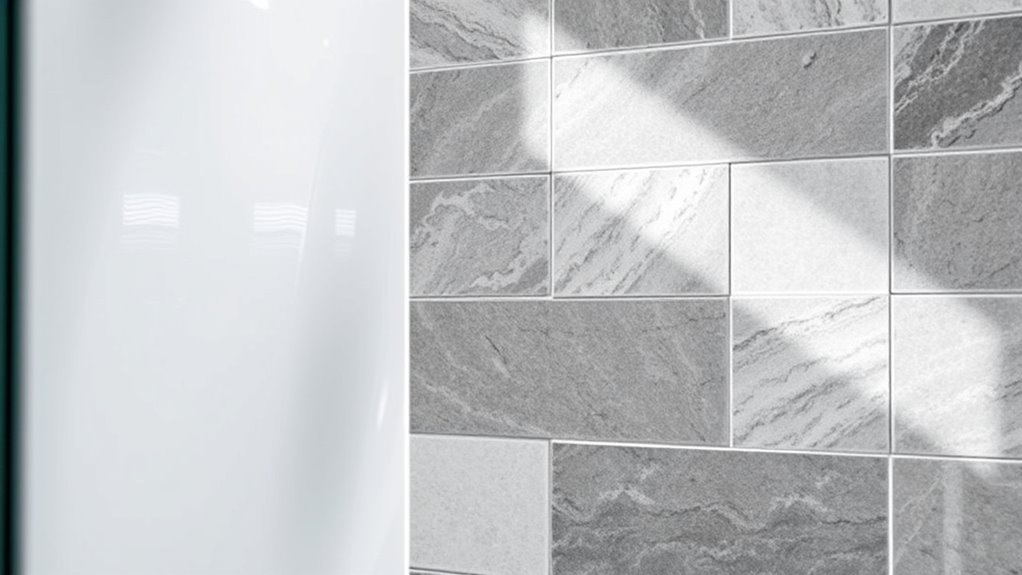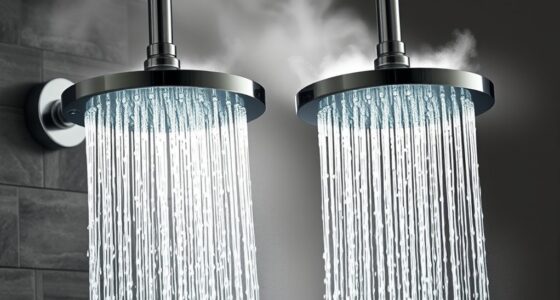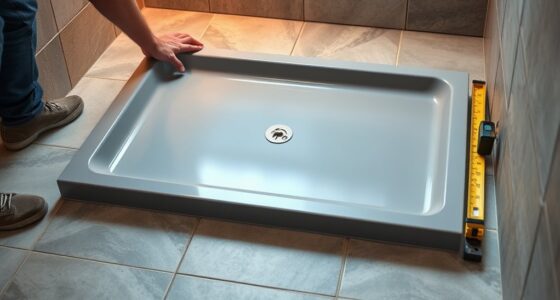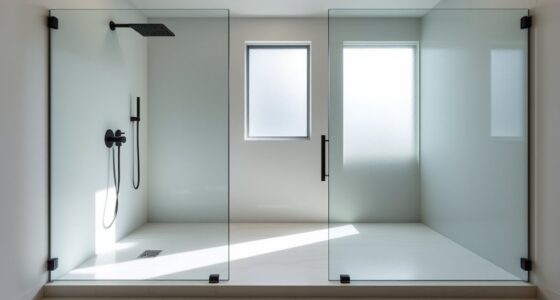Choosing between tile, acrylic, or stone depends on your priorities for durability, style, and maintenance. Tile offers high durability and endless design options but requires professional installation and regular upkeep. Acrylic is easy to install, low maintenance, and resistant to mold, making it great for quick projects. Stone provides a natural, luxurious look but needs careful sealing and can be more fragile. If you want to find the best fit for your needs, exploring each material’s pros and cons will help you make an informed decision.
Key Takeaways
- Tile offers durability and a wide range of design options but requires professional installation and regular grout maintenance.
- Acrylic is easy to install and maintain, making it ideal for quick, DIY-friendly shower upgrades.
- Stone provides a luxurious, natural look but needs frequent sealing and professional installation due to weight and fragility.
- Your choice depends on installation complexity, maintenance willingness, and desired aesthetic appeal.
- All materials require proper sealing and cleaning to prevent mold, water damage, and prolong their lifespan.

Are you unsure which materials are best for your shower? Choosing the right shower material depends on your preferences, budget, and how you plan to use and maintain your space. Tile, acrylic, and stone each have their own installation options, maintenance tips, and unique qualities. Understanding these factors can help you make an informed decision that suits your lifestyle and aesthetic.
Tile is a popular choice because it offers endless design possibilities. You can opt for ceramic, porcelain, or glass tiles, each bringing a different look and feel. When considering installation options, keep in mind that tile requires a sturdy, waterproof substrate and a professional installer for a seamless finish. Although it might seem straightforward, improper installation can lead to water leakage and mold growth over time. Once installed, maintenance tips include regular cleaning with non-abrasive cleaners and sealing grout lines every year or so to keep mold and mildew at bay. Tile’s durability is a plus, but it’s essential to address chips or cracks promptly to prevent water damage behind the tile.
Tile offers endless design options but requires proper installation and maintenance to prevent water damage.
Acrylic showers are known for their ease of installation and low maintenance. They come in pre-formed panels or kits that can be installed directly onto existing structures, making them a popular choice for DIY projects. When choosing acrylic, consider the installation options carefully—most require minimal tools and can be completed in a day. Maintenance tips for acrylic include cleaning with mild soap or non-abrasive cleaners, avoiding harsh chemicals that can cause discoloration or surface damage. Acrylic is resistant to mold and mildew, but it’s best to wipe down surfaces regularly to prevent buildup. Its smooth surface resists staining and is easy to repair if scratches occur, making it a practical choice for busy households.
Stone offers a natural, luxurious aesthetic that many homeowners love. Materials like marble, granite, or travertine provide a timeless look but come with specific installation options. Due to their weight and fragility, stone tiles often require professional installation and reinforced support structures. Maintenance tips for stone involve sealing the surface regularly—sometimes every few months—to prevent staining and water absorption. Unlike tile or acrylic, stone can be more sensitive to acidic cleaners and harsh chemicals, so you need to use pH-neutral products. Though it requires more upkeep, the natural beauty of stone can markedly enhance your shower’s overall appeal and value.
Ultimately, selecting the best shower material depends on your priorities—whether it’s ease of installation, low maintenance, or aesthetic appeal. Each option offers distinct benefits and challenges, so weigh your preferences carefully before making your decision.
Frequently Asked Questions
Which Shower Material Has the Lowest Maintenance Requirements?
When choosing a shower material with low maintenance, consider cleaning routines and durability factors. Acrylic showers are known for their ease of cleaning, needing only regular wiping to stay spotless. They resist mold and mildew better than tile, which requires grout cleaning and sealing. Stone showers demand the most upkeep due to porous surfaces, making them less ideal if low maintenance is your priority. Overall, acrylic offers the simplest, most hassle-free cleaning routine.
Are There Eco-Friendly Options for Shower Materials?
You’re interested in eco-friendly options for shower materials. There are sustainable materials like recycled glass tiles, bamboo, and low-VOC acrylics that reduce environmental impact. These eco-friendly choices not only help conserve resources but also improve indoor air quality. By selecting sustainable materials, you guarantee your shower is both stylish and environmentally responsible, making a positive difference with every use.
How Do Shower Materials Impact Indoor Air Quality?
You might think shower materials don’t affect indoor air quality, but airborne toxins can be released from certain options. Tiles and stone typically emit fewer fumes, while some acrylics can release volatile organic compounds (VOCs). Proper ventilation reduces these effects, helping keep air safe. So, choosing materials with low toxin emissions and ensuring good airflow can protect your indoor environment and improve overall air quality.
What Is the Typical Lifespan of Each Shower Material?
You’ll find that tile typically lasts 50+ years with proper maintenance, making it a durable choice despite higher installation costs and strong aesthetic appeal. Acrylic usually endures around 10-15 years, offering affordability and easier installation but less longevity. Stone showers can last 30-50 years, combining durability with natural beauty, though they can be costly to install. Your choice depends on balancing lifespan, costs, and visual preferences.
Can Different Shower Materials Be Combined in One Design?
Yes, you can combine different shower materials in one design, but you need to take into account custom design and material compatibility. For example, mixing tile with acrylic or stone can create a unique look, but ensure they bond well and expand at similar rates to avoid damage. Consulting a professional helps ensure your chosen materials work harmoniously, resulting in a durable, stylish shower that fits your vision.
Conclusion
Choosing the right shower material depends on your style, budget, and maintenance preferences. Tile offers timeless appeal but requires upkeep, while acrylic is budget-friendly and easy to clean. Stone provides an elegant look but can be pricier and needs sealing. Don’t worry—there’s a perfect option for everyone. Just weigh your priorities, and you’ll find a shower material that suits your needs perfectly, making your bathroom both beautiful and functional.









